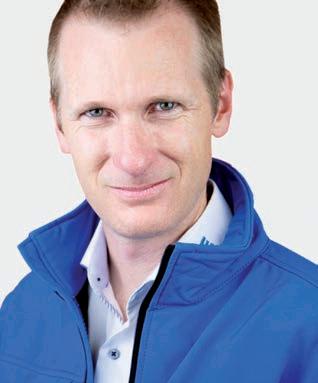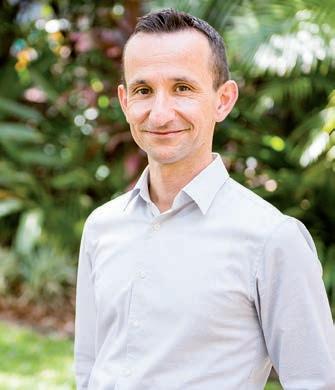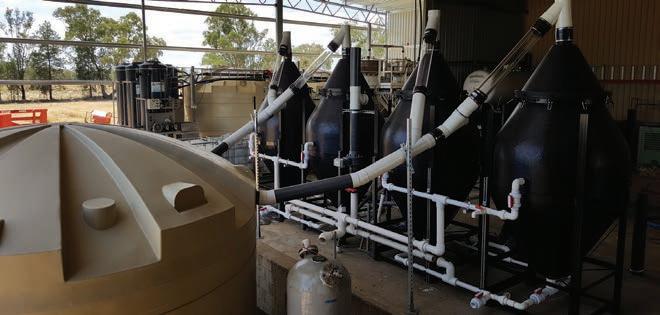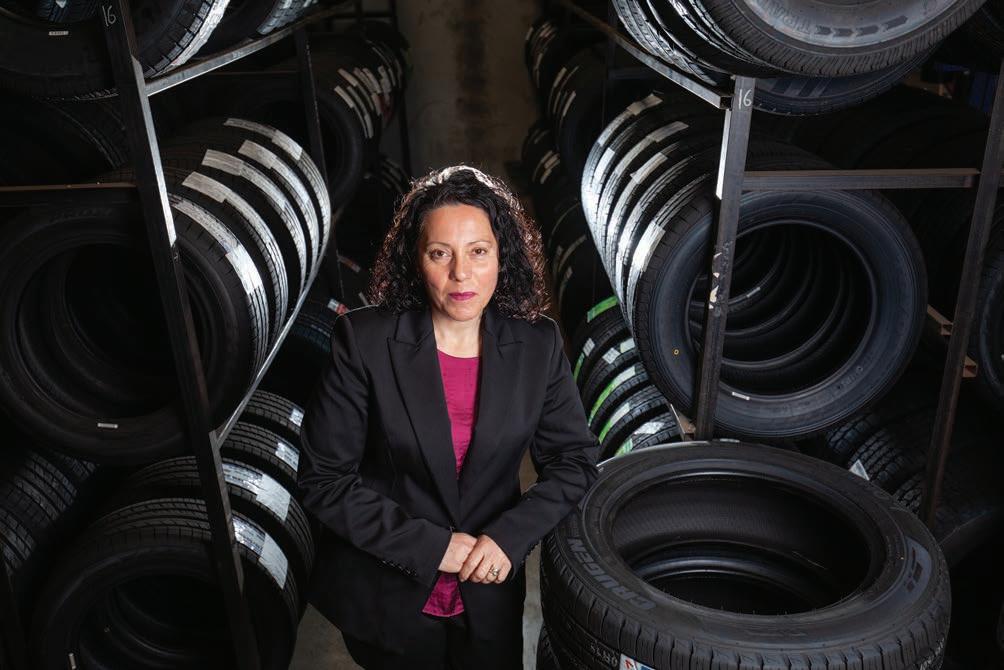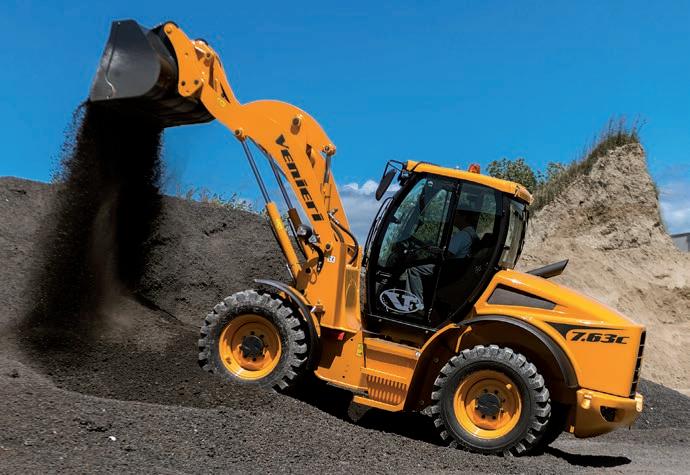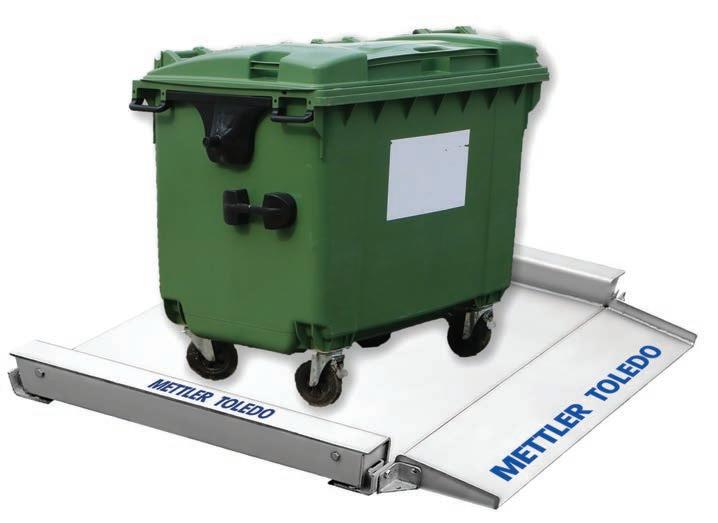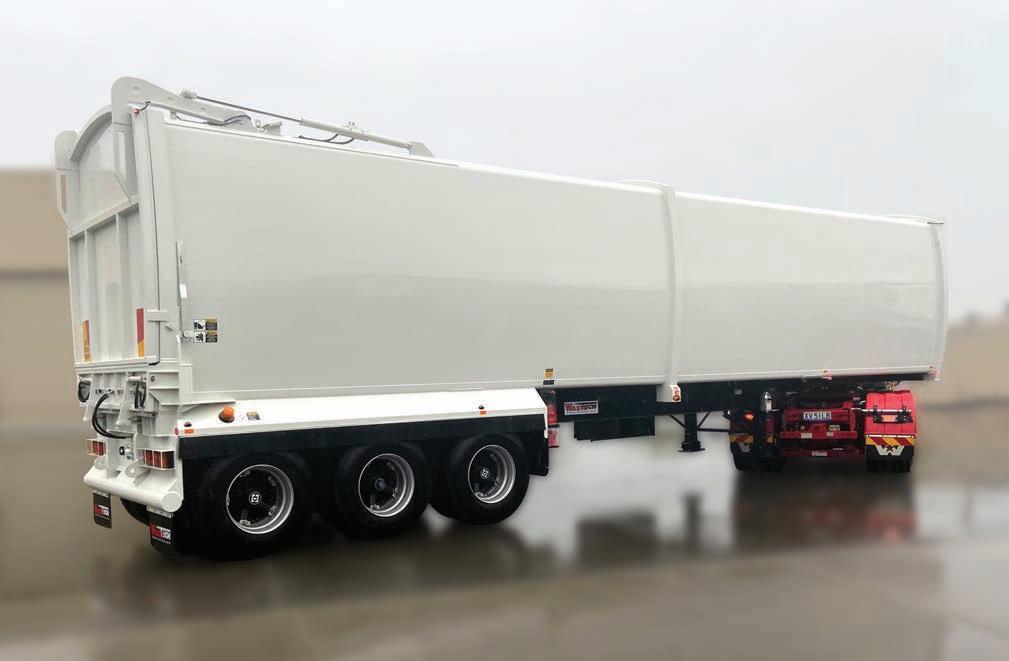
10 minute read
SECURING SMART ACCESS
Smart access makes waste personal
WASTE MANAGEMENT REVIEW SPEAKS WITH BANANA SHIRE COUNCIL’S DR KEITH HALFORD AND DES MACKELLAR ABOUT THEIR PLANS TO DRIVE REGIONAL INVESTMENT THROUGH INDUSTRIAL RESOURCE RECOVERY.
Named after a large bullock called Banana in the 19th century, Banana Shire is resource rich and steeped in agricultural and mining heritage. Situated in Central Queensland, the Shire is sparsely populated, with 15,000 people spread over a 28,550-kilometre squared landmass.
Banana Shire Council maintains eight waste transfer stations and three landfills. Of the 11 sites, eight are unmanned, creating significant illegal dumping issues for council.
Historically, the shire has also had limited access to recycling, which in turn has put stress on its landfill sites.
Over the last year, however, council has started taking a proactive approach, with a suite of new initiatives set to transform waste management and resource recovery in the region. Developments include biosolid and green waste processing systems, and the introduction of paper and cardboard kerbside collection, which will be rolled out over the next 12 months.
These initiatives have largely been spearheaded by council’s Environment and Planning Manager Dr Keith Halford and Principal Environment and Land Management Officer Des Mackellar. To support these developments, the pair have forged a collaborative partnership with waste management software
Dr Keith Halford and Des Mackellar are working with Mandalay Technologies to implement an authenticated site access service at Banana Shire’s waste facilities.
provider Mandalay Technologies, working together to implement an authenticated site access service to provide auditable, controlled entry to sites previously unattended.
The service, which operates through Mandalay’s Resident Access Control program, will deliver automated and approved entry to unmanned facilities using unique resident codes, as well as reporting tools to analyse collected data. According to Mackellar, the partnership is the result of discussions council was having around its current systems in relation to landfill sites and reporting obligations.
Through those conversations, council identified that its existing software program was insufficient.
“During those discussions Mandalay’s name was tossed around, and part of our thinking was to reach out with an idea of securing our sites and also getting a better software package that would flow into our reporting obligations,” Mackellar says.
After initial engagement, he and Halford went to Mandalay’s head office in Brisbane.
“They presented a package to us based on what our vision was, and we’ve now come up with this unique system, which is brilliant,” Mackellar says.
He adds that the integrated system is the first of its kind in Australia.
Mandalay’s Resident Access Control product, which is an extension product of its Resident Product Suite, manages access to unmanned sites, while capturing and processing vehicle movements.
This enables council to keep waste sites secure and provide near real-time access permissions to customers from pre-allocated geographic areas, which in turn works to prevent unauthorised illegal dumping on site.
As part of the system upgrade, Banana Shire has successfully integrated Mandalay’s weighbridge software at its landfill site, which Mackellar explains has been running successfully for three months.
“The hardware for our unmanned transfer stations is being manufactured at the moment, as well as the considerable amount of peripheral infrastructure and power supply.”
In addition to the security benefits of the Resident Access Control program, Halford highlights the system’s ability to segregate and track waste behaviour per person, household, street, suburb and township.
“That allows us to get more meaningful information on the behaviours of residents and how we can change those behaviours though education,” he says.
“It also allows us to enforce the rules of council by limiting the amount of commercial dumping onsite and ensuring people aren’t abusing the system, which is facilitated through security mechanisms in the program.”
Halford adds that the data capture functionalities of Mandalay’s system will enable better future decision making.
“We don’t want to just follow what everyone else is doing,” he says.
“We want to be innovative, think outside the square, and contribute to a more regional response to waste.”
Mandalay has a similarly innovative mindset, Halford says.
He adds that the team has been exceptionally proactive and easy to work with.
“We don’t have to tell them what to do, they come to us with ideas and solutions, which is fantastic. That’s what you’re looking for from a business partner.”
REGIONAL GROWTH
Banana Shire is planning for a period of economic development, with projected that new industries progressively entering the region in the coming decade.
For instance, a major tyre recycling plant is planned to open within 18 months. As more businesses are expected to move into the region, however, the downside is an increase in waste generation.
Banana Shire Council is looking at these potential risks as opportunities to work with current and new businesses to find useful and innovative waste and recycling solutions.
“Using cradle-to-grave planning as a model, businesses should be considering waste in the first instance. What are the cost implications of poorly planning and managing your waste? What opportunities are there for these emerging waste streams? Is there a beneficial use for them here in the Shire or elsewhere?” Halford says.
Halford’s line of thinking forms part of council’s impending Strategic Waste Management Plan.
He explains that Banana Shire is in discussions with local industry to investigate opportunities to develop a Waste Management Centre that would eventually form part of an industrial waste and recycling hub.
Treatment options include oil, tyres, green wastes and bio solids, hydrocarbon contaminated waste, leachate and glass, plastic and paper recycling, with the end result being the production of products useful for industries within the region.
At present, most of these waste streams are transported out of the region to be treated at significant cost.
“This may also provide opportunities for other Shires in Central Queensland or beyond that may have capacity or transportation issues in the future,” Halford says.
“Council is also exploring potential renewable energy projects in conjunction, so a lot is happening in this space.”
Halford’s sentiments are mirrored by Mackellar, who says despite the challenging nature of 2020, the time is right for investment and development.
“Waste and recycling are hot topics on both a state and federal level, plus, COVID-19 has identified the need for more infrastructure capacity in this country,” he says.
“We want to get more infrastructure and businesses into the region, and the work we’re doing with Mandalay is certainly creating a platform for that.”
Paving the way to greener roads
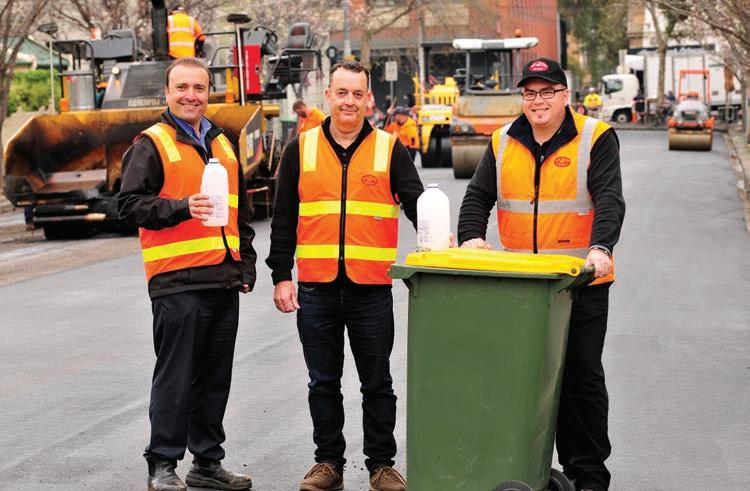
TWO YEARS ON FROM MELBOURNE’S FIRST ‘GREEN ROAD’ WITH POLYPAVE
ASPHALT, ALEX FRASER SHARES THE ROAD AHEAD FOR SUSTAINABLE INFRASTRUCTURE.
It’s a common misconception that “Under the plan, we’ll support transforming Victoria’s busiest putting materials such as broken industry and innovation, advancing roads into some of its greenest glass and soft plastics into the right research and development and infrastructure, built with high volumes bin won’t matter much as there is a supporting clean technologies that will of reclaimed materials. high chance it will eventually be sent create new markets and new business In the two years since its launch, to landfill. opportunities for recycled materials,” Green Roads PolyPave projects
In February this year, the Victorian Victorian Environment Minister Lily have been successfully implemented Government unveiled Recycling D’Ambrosio said. across nine municipal councils across Victoria, its sweeping plan of reform Brendan Camilleri, Asphalt GM Victoria and three local government to establish a recycling system that at Alex Fraser, says the company is areas in Queensland, resulting in Victorians can rely on. supporting Victoria’s circular economy overwhelmingly positive feedback.
A key component of the 10-year through the ongoing rollout of its Alex Fraser has many more projects policy and action plan is to change Green Roads PolyPave Asphalt. in the works, paving the way towards how Victorians recycle, so that The innovative, high performance sustainable infrastructure. Reflecting materials collected from households asphalt product contains recycled on the initiative, Camilleri says there are high quality and can be used again materials, including plastic, glass is a project that resonates highly with to make new products. and reclaimed asphalt pavement, him. “The resurfacing project in Yarra City Council was one of our first and most memorable PolyPave projects,” he says. Camilleri credits ongoing collaboration with government, industry and community as key to this successful initiative, which is effectively closing the loop on the recycling of multiple problem waste streams. Stanley and Margaret Streets in Richmond were repaved with PolyPave, containing recycled glass, reclaimed asphalt, and HDPE plastic amounting to almost 100 tonnes of recycled waste. The premiere project reduced landfill by 97.3 tonnes and carbon emissions by 633 kilograms.
Green Roads PolyPave developers Brendan Camilleri, Peter Lazarus and Nathan Delaney are committed to developing end-market solutions for problematic waste streams. Approximately 7,300 two litre plastic bottles and 55,000 glass bottles
were repurposed – equivalent to 1500 wheelie bins of waste glass and plastic, or the annual kerbside recycling collection for every household in the street.
“I will never forget the residents’ surprise when they realised that they had helped to build their own street with what they put in their recycling bins. Yarra City Council received incredible feedback from their community who were proud to see their recycling efforts were making a difference to the circular economy and the environment,” Camilleri says.
He highlights PolyPave as a standout example of how local communities can play an active and important role in sustainable outcomes.
“Local governments’ and communities’ role in recycling goes far beyond kerbside collection. None of us want to see tonnes of useful and reusable materials end up in landfill. That’s what drives Alex Fraser to keep innovating and finding new ways to recover, recycle and reuse problem waste materials,” Camilleri says.
“We’re diverting more than three million tonnes from landfill every year to manufacture the quality, sustainable construction materials needed to build greener roads.”
Camilleri says that while the sustainability benefits of using PolyPave Asphalt are well recognised, the highperformance asphalt product has much more to offer when it comes to quality and longevity. The reuse of recycled material in PolyPave can reduce the carbon footprint of road projects by up to 65 per cent, and results is a considerably stronger pavement.
“Laboratory test results showed increased fatigue life, improved asphalt rut resistance, increased asphalt modulus/stiffness and a better resistance to moisture ingress,” he says.
“The research and development
The reuse of recycled material in PolyPave can reduce the carbon footprint of road projects by up to 65 per cent.
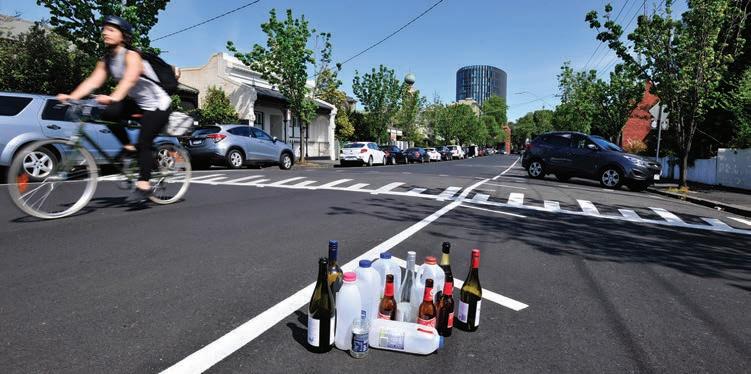
behind PolyPave has ensured it performs well on heavily trafficked roads and that – dependent on individual operating conditions – our customer can expect greater durability and a longer lifetime from their green roads.”
When it comes to development of Green Roads asphalt mixes, Camilleri says it’s a thorough process that is highly bespoke.
“Before we can start producing PolyPave the plastics must be recovered, sorted, washed and shredded; the glass must be carefully separated from co-mingled paper, metals and plastics, before the resulting fines can be processed into the specified aggregates approved for the asphalt mix design,” he says.
Back in May 2019, Alex Fraser opened its new high recycled technology asphalt plant along with an innovative glass recycling plant at the company’s Sustainable Supply Hub in Laverton North. Camilleri says the new facilities have been pivotal to the ongoing innovation behind Green Roads products. Camilleri notes that PolyPave is just one product in a broad suite of sustainable civil construction products recycled and manufactured by Alex Fraser. The recycling leader has continually evolved to innovate recycled materials over several decades.
“Back in 2018 when we first paved Melbourne’s greenest Road with Yarra City Council, we revolutionised plastic in asphalt by incorporating the stuff you put into your recycling bin into a quality product used to build the roads you drive on every day,” he says.
Next up, the greener roads ambassadors are developing another Green Roads asphalt mix that aims to reuse volumes of soft plastics to markedly reduce the number of plastic bags and other singleuse plastics ending up landfill, and the contamination of oceans and waterways.
“We are constantly working with our partners in industry and government to find innovative ways to lift the bar on sustainability and reduce the environmental impact of building and maintaining our cities. It’s part of our ‘green roads’ promise, and what makes us Australia’s go-to provider for sustainable construction materials,” he says.
“PolyPave is a shining example of how we can close the loop on recycling; using recycled materials to build greener roads that deliver on sustainability, quality, cost and performance. With PolyPave, we’re literally paving the way to a greener future.”

